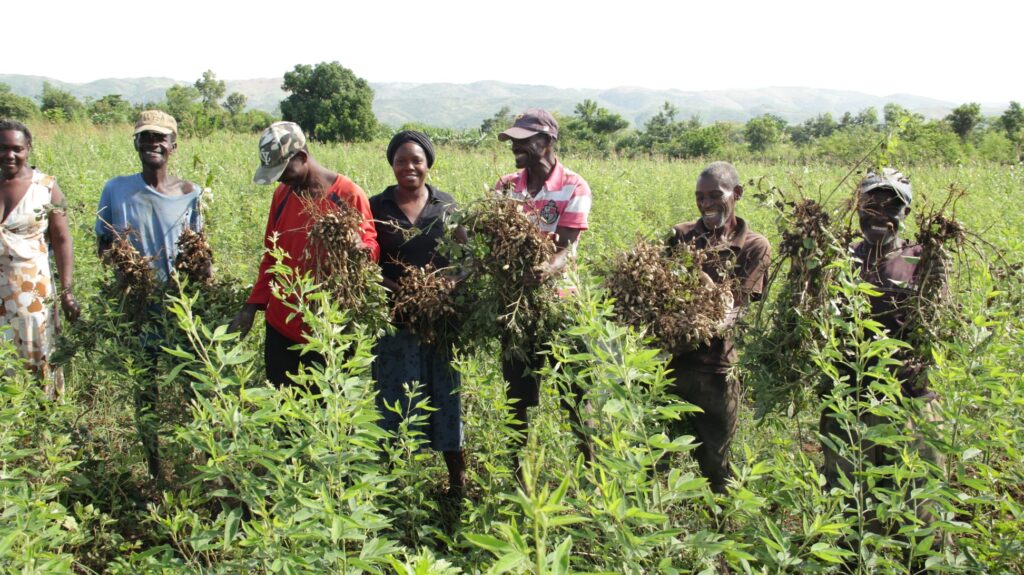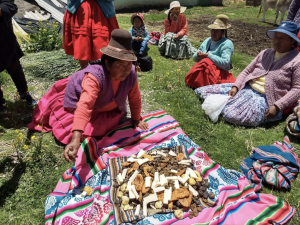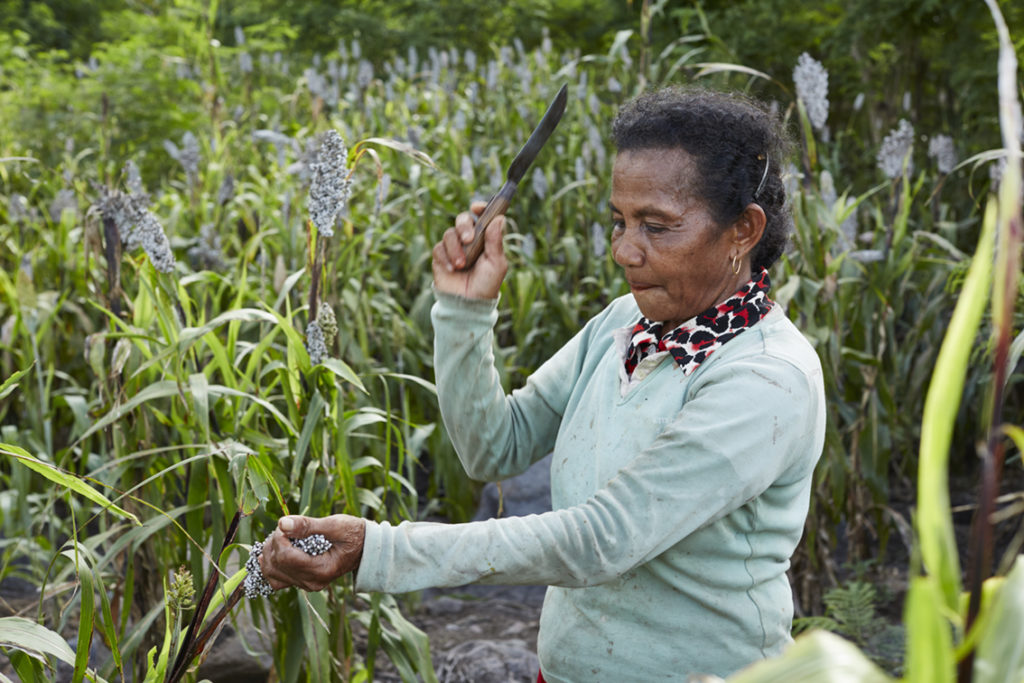This World Food Day, the stakes over the future of our food systems are exceptionally high. Fueled by destructive food systems, global hunger and ecological destruction are both on the rise. Global food systems are responsible for over half of global greenhouse gas emissions, which are heating the planet and causing climate catastrophe. Corporate control of food systems is also harming human rights around the world, from access to food to the rights of peasants and Indigenous Peoples to land and territory.
Food systems do not have to be this way. There exists an alternative that can draw down greenhouse gas emissions, cool the planet, and ensure adequate nutrition for everyone. The answer lies in food sovereignty and agroecology.

Meet Elizabeth Mpofu from Shashe, Zimbabwe. Elizabeth is the chairperson of the Zimbabwe Smallholder Organic Farmers’ Forum (ZIMSOFF). Elizabeth is also the general coordinator of the global farmers’ network La Via Campesina (LVC), of which ZIMSOFF has been an official member since 2013. Elizabeth is one of the millions of farmers around the world practicing agroecology and farming systems based on Indigenous knowledge. Agroecology challenges the power structures in our food systems and shifts decision making away from corporations towards farmers. Elizabeth’s work mounts a resistance to corporate-controlled food systems and shows us that a different way of growing and consuming food is possible. We celebrate this crucial work as we commemorate World Food Day.
The CLIMA Fund supports ZIMSOFF, LVC, and hundreds of other food sovereignty movements globally. Food sovereignty, the idea that those who produce, distribute, and consume food should also decide food policy, was put forward by La Via Campesina 25 years ago at the World Food Summit. The food sovereignty movement is a direct response to the oppressive industrial agriculture system and the corporate capture of food systems and policies, which disenfranchises farmers. Industrial agriculture practices also reduce biodiversity, harm soil fertility, and threaten farmer-managed seed systems. The food sovereignty movement shifts the balance of power in the food system. It puts control into the hands of those responsible for feeding the majority of the world: small-scale food producers. In the last 25 years, the food sovereignty movement has grown in power, influence, and impact.

In contrast with industrial agriculture, community-controlled peasant agriculture contributes to more than just the food system. Following the recent earthquake that rocked southern Haiti, Mouvement Paysan Papay (A La Via Campesina member) is working with impacted communities to implement agroecology to avert a hunger crisis in the coming months while serving as an engine for economic recovery. Image by: Mouvement Paysan Papay.
A key pillar of food sovereignty is agroecology, the practice, science, and movement that uses ecological concepts and principles to design and manage agricultural systems. Agroecology shifts food production from a fossil fuel-intensive practice to one that relies on natural processes. Agroecology empowers local communities with Indigenous knowledge, local seed production, local consumption of food, and crop diversification.

As communities control the production and distribution of food, our grantee partners make connections far and wide. Our partners have deep roots within their communities, which enable them to show up for each other in times of crisis. The women-led National Network of Women Farmers for Family Agriculture in Peru is doing just that during the COVID-19 pandemic. It delivers food baskets and critical monetary aid to women and families in isolated rural areas, distributing information in different Indigenous languages, and leveraging traditional food and medicinal knowledge to help those with symptoms through their Community Solidarity Committees. Image courtesy of Thousand Currents.
Small-scale farming, at the cutting edge of agroecology, feeds 70% of the world’s population while using only 30% of agricultural land and water. Agroecology boosts nutrition and creates the conditions for economic transformation while sequestering carbon in the soil. Corporate control of agriculture makes farmers dependent on global corporations for seeds, fertilizers, insecticides, and decisions about what to grow and how. Agroecology enables farmers to break the dependency fostered by industrial agriculture without compromising the sustainability of food production. If agroecology were invested in and applied at scale, it would mitigate the same amount of carbon emissions by 2050 as what China emits in the same time period.

Thousand Currents and Grassroots International’s partner Landless Workers’ Movement’s (MST) Internationalist Samora Machel Brigade is distributing hand sanitizers and masks to slow down the spread of the disease. MST’s internationalist brigades manifest internationalism as a revolutionary strategy to accumulate forces and defeat capital in different places in the world. In practice, this means that this Brazilian articulation can inspire and work with movements in Zambia, Venezuela, Haiti, and other countries. Image by Landless Workers’ Movement.
Funders have the opportunity to invest in food producers and systems that are cooling the planet, building community resilience, and shifting power back into the hands of those who produce the world’s food. As funders, we recognize how grassroots movements work beyond silos, centering community strength and self-determination while advancing equitable solutions to interlocking crises.
On the frontlines of the climate crisis, movements for food sovereignty cannot be de-linked from climate, feminist, economic justice, and disability rights movements. Food sovereignty movements like La Via Campesina have demonstrated unparalleled results for decades. Funders have the opportunity to support these groups through long-term, unrestricted funding and providing non-financial support, including technical assistance, capacity building for leadership and organizational development, connections to other movement organizations, invitations to learning exchanges, and funder advocacy.

Agricultural systems managed by small-scale farmers are able to produce culturally appropriate foods while being less resource-intensive. CLIMA member Global Greengrants Fund’s grantee partner Maria Loretha mobilized women farmers in East Flores, Indonesia to produce sorghum. While the crop is more labor-intensive than rice and maize, it requires less water and is more nutritious and versatile than the other grains. The project, which initially involved 62 families, has proven so successful it has now reached other parts of the country, freeing farmers from reliance on fertilizers and pesticides, and alleviating impacts of a cycle of poverty and droughts. Image by: Martin Westlake.
This World Food Day, we honor the thousands of grassroots food sovereignty movements challenging the status quo and creating equitable and sustainable food systems. We commit to standing with food sovereignty movements for the long haul and invite other funders to join us.